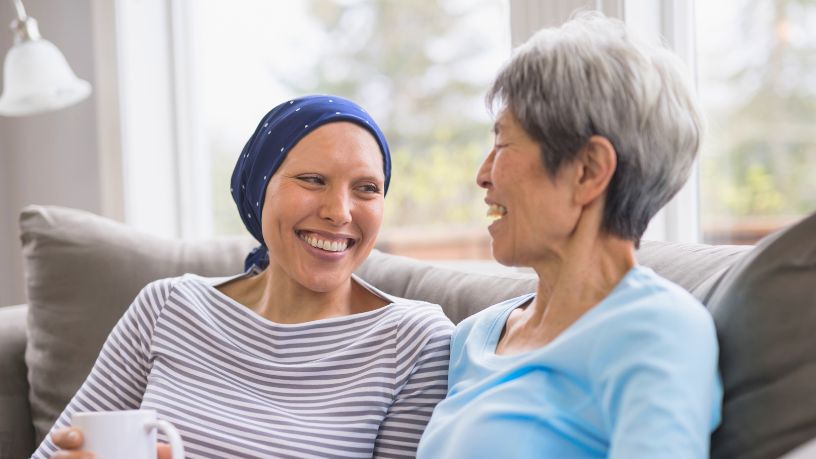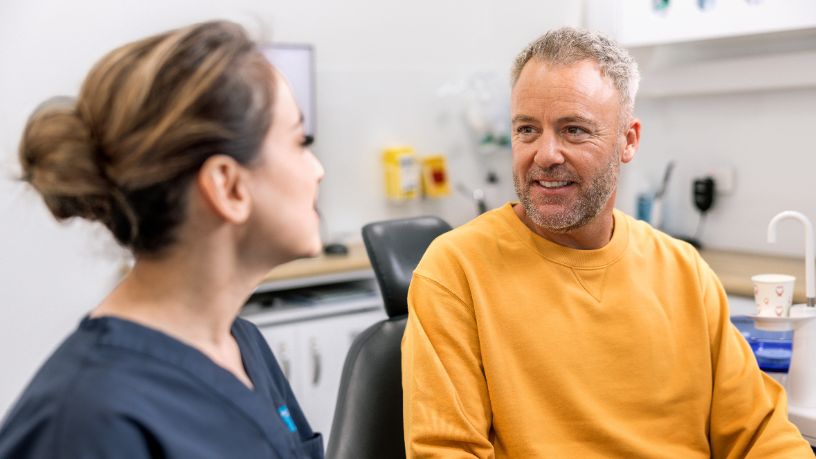On this page
Key takeaways
- Simple adjustments to your diet may help to relieve the side effects of cancer treatment.
- High-calorie, high-energy foods may be needed to minimise weight loss.
- Eating from all food groups, including protein, whole grains, vegetables and dairy will help to keep your body strong during treatment and recovery.
If you’ve just had cancer surgery or started treatment, food may not be high on the list of the things you’re thinking about.
You might have lost your appetite, you might feel nauseated, you might feel as if the effort to eat is just too much, I know, I’ve felt like that, too. But no matter how unappealing the thought of food might be, a nutritious diet is important to your recovery.
If you are struggling with eating well, or if you’re caring for someone in this situation, Bupa Health Coach and Dietitian Karyn Chea has some strategies to try.
How diet can help manage side effects
It’s no secret that cancer treatment can cause a host of unpleasant side-effects that can make mealtime a chore. These can include nausea, a dry mouth, loss of taste, constipation, diarrhea and mouth ulcers.
I found a dry mouth often made it difficult to swallow and it was painful trying to eat with nasty ulcers in and around my mouth. It was also tempting to opt for eating very little when my stomach was unsettled and I knew that any food I consumed would result in an urgent trip to the toilet.
Karyn acknowledges how difficult eating can sometimes seem.
“Eating may be the last thing on your mind and there may be times where the thought of food makes your stomach turn,” she says. “That in mind, doing your best to prioritise nutrition will help keep your body as strong as possible throughout the course of treatment and recovery. Even a few bites or sips of a nourishing drink is better than nothing. Every mouthful counts!”
She offers these suggestions to help manage treatment side effects:
- Nausea: an empty stomach can often make nausea worse, so try smaller, more regular meals throughout the day. Try dry crackers and bland or cold/room temperature foods as these can be better tolerated.
- Diarrhea: drink plenty of fluids including water and electrolytes if needed. Limit spicy and fatty foods, alcohol and caffeine. It may also help to limit foods high in insoluble fibre, such as nuts and seeds and the skin on fruits and vegetables. Instead, opt for foods rich in soluble fibre such as oats, bananas, legumes and peeled fruits and vegetables.
- Constipation: plenty of water (aim for 8-10 glasses) and fibre from fruits, vegetables and wholegrains is key. Kiwi fruit, prunes and pears can be particularly helpful. Try gentle exercise, such as walking, to stimulate the bowels.
- Mouth ulcers: try softer foods and avoid spicy or acidic foods and drinks.
- Dry mouth: try rinsing your mouth often, sucking on ice chips and keeping your mouth hydrated with small sips of fluids during meals and throughout the day. You can also add extra sauce or gravy to your foods or chew on sugar-free gum to help stimulate saliva.
- Loss of appetite: setting an alarm to have small, regular meals can be helpful. Work with your appetite and prioritise high-energy (calorie) high-protein foods to get the most out of every mouthful. Nutritional supplement drinks can also be helpful when you don’t feel like eating.
What foods should you eat?
It is important to eat a good variety of foods from all food groups including protein, wholegrains, fruits, vegetables, and dairy.
“Your body has increased energy demands during cancer and treatment, so it is not uncommon for weight loss to be an issue,” Karyn says.
“It is crucial to eat enough to help minimise unintentional weight loss and preserve muscles stores to help stay strong and recover faster.”
Simple meal ideas are:
- Breakfast: eggs or baked beans on wholegrain toast, high protein yoghurt with muesli, smoothies with yoghurt, fruit and protein powder
- Lunch/dinner: sandwiches or wraps with protein rich fillings such as tuna, chicken or eggs, soups with meat and legumes/lentils
- Snacks: fruit and high-protein yoghurt, cottage cheese and crackers, canned tuna, nourishing drinks such as milk, Milo, Up & Go, smoothies.
The Cancer Council has great recipe and meal ideas.1
Keeping hydrated
If you’re vomiting, suffering from diarrhea or not eating enough, you can be at risk of dehydration. Sometimes fatigue also plays a part because it’s simply too much effort to get up regularly to get a drink.
Karyn suggests a practical way to overcome this is to keep a small, insulated container stocked with drinks placed within reaching distance.
Other suggestions to boost hydration effectively are:
- filling up a jug of water or a large drink bottle to help you keep track of how much you are drinking
- taking small regular sips throughout the day instead of trying to chug down large amounts at once
- nourishing drinks, such as milk and smoothies
- sparkling water with a squeeze of lemon or lime juice or hot/cold herbal teas.
Make the most of offers of help
Friends and family are often keen to offer support by preparing meals, so Karyn suggests providing them with ideas on what to cook.
“Let them know what your favourite foods are and if there is anything you don’t like,” she says.
“Freezer friendly meal ideas are pasta sauces, lasagne, frittatas, soups, and casseroles. It can be helpful to ask them to portion out foods in single serve containers to make it easier to heat up.”

At Bupa, trust is everything
Our health and wellbeing information is regularly reviewed and maintained by a team of healthcare experts, to ensure its relevancy and accuracy. Everyone's health journey is unique and health outcomes vary from person to person.
This content is not a replacement for personalised and specific medical, healthcare, or other professional advice. If you have concerns about your health, see your doctor or other health professional.
You might also like
Exercise and cancer: Is it safe?
We all know exercise is good for you, but is it still safe to work out when you're fighting cancer? We unpack how exercise could support your treatment.
Exercise helped me survive cancer
Michelle was diagnosed with cancer at 60. Find out how sticking to a personalised exercise routine helped during her treatment.
How to support a loved one through chemotherapy
Caring for a loved one going through chemo can seem like a daunting task, so we've put together a list of simple ways you can help support them.
How to look after your oral health during cancer treatment
We’re all familiar with the common side effects associated with cancer and treatment, but did you know your oral health can be affected too? Find out how.





